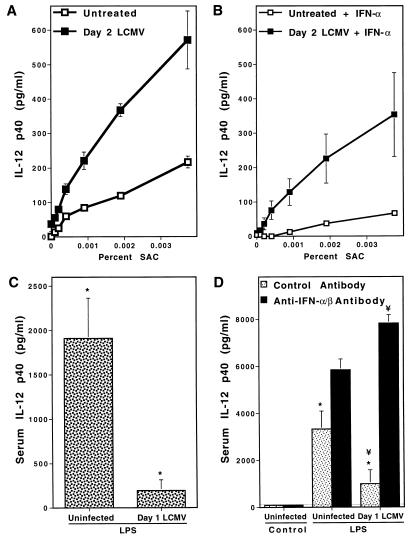Figure 4.
Effects of IFN-α/β during LCMV infection on cellular responsiveness to in vitro and in vivo stimulation of IL-12 production. Virus-induced IFN-α/β effects were examined in vitro by stimulating splenic leukocytes prepared from uninfected or LCMV-infected C57BL/6 mice with SAC, and evaluating IL-12 production (A and B). Cells, isolated from untreated (□) or day 2 LCMV-infected (▪) mice, were stimulated in vitro with 2-fold serial dilutions of SAC (0.12–0.001%) alone (A) or in the presence of 104 units/ml of IFN-α (B). Supernatant fluids were harvested after 24 hr and IL-12 p40 was measured by ELISA. In vivo responsiveness to a replication-independent stimulus of IL-12 in the context of virus-induced IFN-α/β was examined by administering 5 μg of S. enteriditis-derived LPS to uninfected or day 1 LCMV-infected C57BL/6 mice (C and D). Serum samples were prepared for IL-12 p40 by ELISA at 4 hr after LPS administration. Uninfected and infected mice treated with PBS only did not produce significant levels of serum IL-12 p40 (data not shown). Means ± SE of results from three mice per group are shown for all experiments. In vivo IL-12 induction by LPS in uninfected and day 1 LCMV-infected mice is shown (C). The role of endogenous IFN-α/β for inhibition of IL-12 stimulation in LCMV-infected mice was examined by treating uninfected and day 1 LCMV-infected mice with control antibody (□) or anti-IFN-α/β (▪) (D). Samples from uninfected and infected mice given LPS (C and D) were significantly different (∗), as were those from anti-IFN-α/β- compared with control-treated mice given LPS one day after LCMV infection (¥) as determined by a Student’s t test (P < 0.05) (D).

